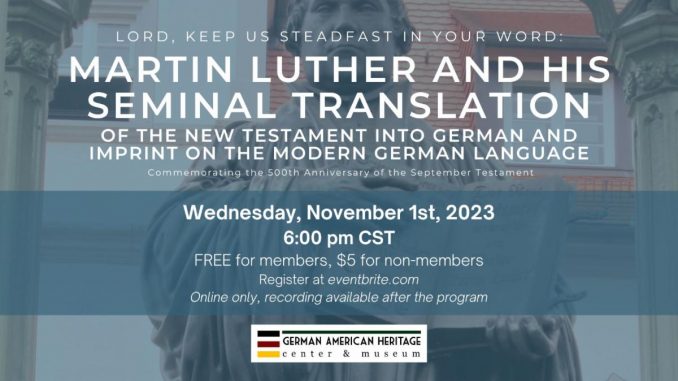
During his nearly yearlong protective seclusion at Wartburg Castle above Eisenach, Electoral Saxony, Germany, following his refusal in 1521 to recant before Emperor Charles V at the Imperial Diet at Worms, excommunication by the Roman Church, and condemnation in the Edict of Worms, Martin Luther embarked on his monumental translation of the New Testament from the original Greek into masterful German. First published in 1522, the September Testament (Das Newe Testament Deutzsch) was a work of linguistic genius and an immediate best seller. Luther’s seminal translation lent vitality and did justice to the heart and spirit of Holy Scripture, provided unprecedented public access to it and a means to fortify Christian faith. At the same time, Luther’s New Testament translation also provided an extraordinary model of German that was widely embraced and which in no small measure contributed to the modern standard German language. The formal presentation examines the historical context, components, methods, character, and impact of Luther’s translation, and features a comprehensive visual supplement. Included are museum period portraits of Martin Luther, Pope Leo X, Prince Elector Frederick III—the Wise, Philipp Melanchthon, and Luther’s beloved Katharina von Bora. Also featured from museum exhibits are the 95 Theses, the 1522 September Testament, complete 1534 Luther Bible, and related Reformation era documents. The visual component also includes on-site images of the Wartburg and Luther’s quarters 1521-1522, Eisenach, Wittenberg, the Schlosskirche (Castle Church), and the Lutherstube (family living quarters) in the former Black Cloister (Lutherhaus).
About the Speaker:
“Lord, Keep Us Steadfast in Your Word” is one of several recent publications and illustrated lectures in Lutheran, Reformation, German, and ethnic German history by Russell Baldner. Among the presenter’s earliest forays in German primary source historical research were family documents and original manuscripts of his ancestral German-Lutheran congregation written in Kurrentschrift, an archaic seldom read German cursive script. Russell’s early affection for the German language and history led to B.A. and M.A. degrees in history and undergraduate and graduate study in German, a career in education, and lifetime of research, publication, and public speaking in those and related fields, as well as repeated sojourns in ancestral Germany. In September 2022, Russell and wife Cathryn co-hosted “Medieval to Modern Hearts of Germany,” a two-week group tour in northeastern Germany proposed and largely designed by Baldner in conjunction with and sponsored by the University of Northern Iowa, his alma mater. Included were return visits to major Martin Luther historical sites; pre-departure orientations by Baldner focusing on Germany’s history, language, and social-cultural landscape, as well as supplemental historical lectures and commentaries while on tour; and a renewed and welcome opportunity daily to converse in the language of his heritage.
Date and time: Wednesday, November 1 · 4 – 5pm PDT
Location: Online
For more information and tickets please click here